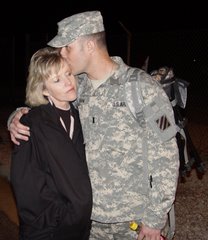Story and photos by Spc. Ben Hutto
3rd Brigade Combat Team Public Affairs
FORWARD OPERATING BASE HAMMER, Iraq – With any deployment there are rumors, one very dangerous one is that only Soldiers who leave the forward operating base are susceptible to combat stress.
“Combat stress is all the physical and emotional reactions to being in a combat zone or extended combat operations,” explained Capt. Angela Mobbs, from Corpus Christi, Texas, the brigade psychologist for the 3rd Heavy Brigade Combat Team.
Mobbs explained that combat stress can happen to anyone. It can be triggered by a violent event, such as an improvised explosive device attack on a convoy. Combat stress can also be triggered by being away from a person’s normal surroundings for an extended amount of time.
There’s combat stress and there’s post traumatic stress disorder -- they are not the same.
“PTSD is much more severe and rare,” said Mobbs. “PTSD is a cluster of symptoms that happen for an extended period of time that interfere with situational and occupational function. The symptoms do not regress. Combat stress can be worked through and the symptoms will regress.”
Mobbs said Soldiers have a variety of ways to get counseling.
“They can make an appointment though sick call or have their chain of command set up an appointment for them,” she said.
An appointment with the brigade psychologist is not the only avenue Soldiers have for dealing with combat stress. Every battalion has a chaplain who is there for Soldiers, she said.
“When Soldiers come to me, the number one thing I try to do is listen,” said Chaplain (Capt.) Anthony Randall, from, Arvada, Colo., the chaplain for the 3rd Squadron, 1st Cavalry Regiment. “I provide them with a safe place to process their feelings without feeling weak, insecure or less of a Soldier. They don’t have to worry about being made fun of. My goal is to get them to see that combat stress is a simple reality of what we do. Since it is real, my goal is to help them identify and overcome it.”
Randall explained that there are many aspects that a Soldier can concentrate on to relieve combat stress.
“They can control combat stress with mental and physical coping mechanisms and faith,” explained Randall. “I believe faith is paramount. If we truly have faith in God, we can truly believe in hope when we are surrounded by evil.”
Randall also pointed out that Soldiers who aren’t leaving the FOB are just as susceptible to combat stress as Soldiers who go out on frequent missions.
“Complacency and boredom can lead to combat stress,” said Randall. “Combat stress isn’t just the Soldier with the 1,000-yard stare and the shaky hands because a sniper round bounced off his Kevlar. Soldiers that have time on their hands can start concentrating on where they are and the things they don’t have.”
Randall points out that no matter what reasons Soldiers have for experiencing combat stress they have avenues to relieve it.
Sgt. 1st Class Larry Seals, 34, Camden, Ark., the senior data systems integrator for the 3rd HBCT, believes that Soldiers need to look out for one another and help their fellow Soldiers when they believe combat stress is becoming a problem.
“As a battle buddy you can do a lot,” said Seals. “Soldiers need to look for changes in people’s behavior. Loud Soldiers might become quiet. Quiet Soldiers may start talking a little more. Soldiers might start distancing themselves from their peers. Soldiers need to look out for each other and know how the people around them act so they can pick up when things aren’t right.”
Seals points out that Soldiers are more likely to identify when one of their own is having a hard time because they live with them and interact with them regularly.
“If you think your battle buddy is having a hard time, you need to occupy his time,” said Seals. “Spend more time talking to them. Ask them to go to the MWR (Morale, Welfare and Recreation) tent with you. Ask if they want to go to chow with you. Volunteer to go to the chaplain with them. You have to spend time with them and get them out.”
Mobbs, Randall and Seals all agree that ignoring combat stress isn’t an effective solution. Soldiers have a variety of avenues they can use to relieve the pressure caused by combat stress. An important step for a Soldier affected by combat stress is finding the avenue that works best for them.
“It’s not important who a Soldier talks to,” said Seals. “It is important that they talk to someone. In general, Soldiers want to help each other and I think it’s important for people to remember that and not get caught up in a negative thought process.”
Tuesday, June 26, 2007
Subscribe to:
Post Comments (Atom)





No comments:
Post a Comment